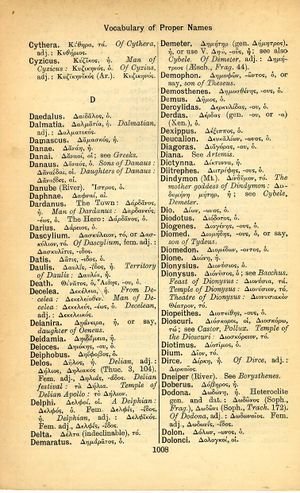Diogenes: Difference between revisions
τὸ ἀγαθὸν αἱρετόν· τὸ δ' αἱρετὸν ἀρεστόν· τὸ δ' ἀρεστὸν ἐπαινετόν· τὸ δ' ἐπαινετὸν καλόν → what is good is chosen, what is chosen is approved, what is approved is admired, what is admired is beautiful
(D_3) |
(Gf-D_3) |
||
| Line 1: | Line 1: | ||
{{WoodhouseENELnames | {{WoodhouseENELnames | ||
|Text=[[File:woodhouse_1008.jpg|thumb|link= | |Text=[[File:woodhouse_1008.jpg|thumb | ||
|link={{filepath:woodhouse_1008.jpg}}]]Διογένης, -ους, ὁ. | |||
}} | }} | ||
{{Lewis | {{Lewis | ||
Revision as of 07:35, 14 August 2017
English > Greek (Woodhouse)
Διογένης, -ους, ὁ.
Latin > English (Lewis & Short)
Dĭŏgĕnes: is, m., = Διογένης.
I Apolloniates, a celebrated Ionian philosopher, pupil of Anaximenes, Cic. N. D. 1, 12, 29.—
II The well-known Cynic philosopher of Sinope, Cic. Tusc. 1, 43, 104; id. N. D. 3, 34; id. Mur. 36 et saep.—
III A Stoic, teacher of Carneades and Laelius, Cic. Div. 1, 3, 6; id. Fin. 2, 8; id. Tusc. 4, 3; id. de Sen. 7 et saep.—
A friend of M. Caelius Rufus, Cic. Fam. 2, 12, 2; id. Cael. ib. 8, 8, 10.
Latin > French (Gaffiot 2016)
Dĭŏgĕnēs,¹¹ is, acc. em et en, m. (Διογένης),
1 Diogenes Apolloniates Cic. Nat. 1, 29, Diogène philosophe ionien, disciple d’Anaximène]
2 philosophe cynique : Cic. Tusc. 1, 104
3 surnommé le Babylonien, philosophe stoïcien : Cic. Div. 1, 6
4 peintre célèbre : Plin. 35, 40
5 ami de Cælius Rufus : Cic. Fam. 2, 12, 2.

